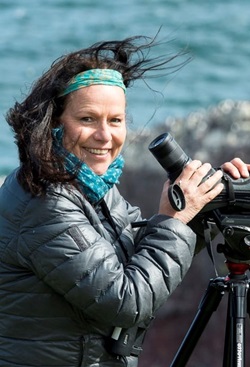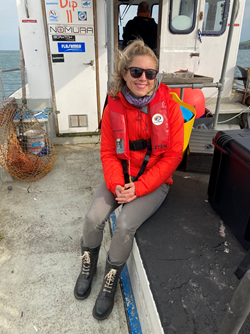People on the west coast are being urged to keep their eyes peeled for herring
Researchers at Edinburgh Napier University are urging locals, fishers, adventurers, and wildlife enthusiasts to record signs of herring as part of a citizen-science project to help rebuild west coast herring populations.
Atlantic herring formed the basis of the world’s largest fishery in Scotland during the 19th and early 20th centuries. After stocks collapsed in the 1970s, herring populations on the west coast of Scotland failed to recover and some disappeared entirely.
However, spawning herring were detected off Wester Ross in spring 2018 and large shoals have been observed each year since, raising local hopes that spring-spawning herring populations are on the way to recovery – and prompting this latest effort.

The West of Scotland Herring Hunt (WOSHH) project lead and Marine Ecology Professor Karen Diele (above) from Edinburgh Napier University’s School of Applied Sciences said: “With so many people starting to get out and about again after the long winter months, we are hoping anyone around the west coast will keep their eyes peeled for signs of the silver darlings.
“The spawning of herring is about to kick off, and large shoals will already be nearshore. These attract big numbers of feeding seabirds and marine mammals – all great signs of herring being present, wonderful to watch and important to record!
“Anyone can share both contemporary and historical herring sightings using our new ‘Herring Hunt’, webapp https://scottishherring.org/herring-hunt-2023/.
Dr Michelle Frost (below), researcher on the WOSHH project said: “The webapp can be used by anyone throughout the year to record Atlantic herring, especially during spawning seasons.
“People may even spot egg ‘carpets’ – herring deposit their sticky eggs onto the seabed, sometimes covering several square miles. The eggs and larvae are important food for other species, such as sandeels and haddock.
“The Herring Hunt webapp was developed with our University colleagues from Computing and is very easy to use from a mobile phone or computer, taking no longer than a few minutes to report signs of herring.
“Herring deserve our attention so that they can rebuild resilient populations on the West coast where and when possible, which would boost the marine ecosystem as a whole.”
The West of Scotland Herring Hunt is funded by the William Grant Foundation, a non-profit association established to support charitable causes in Scotland. Its work is funded by William Grant and Sons Ltd.